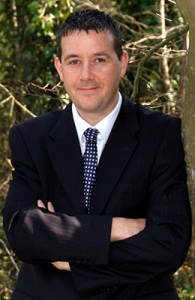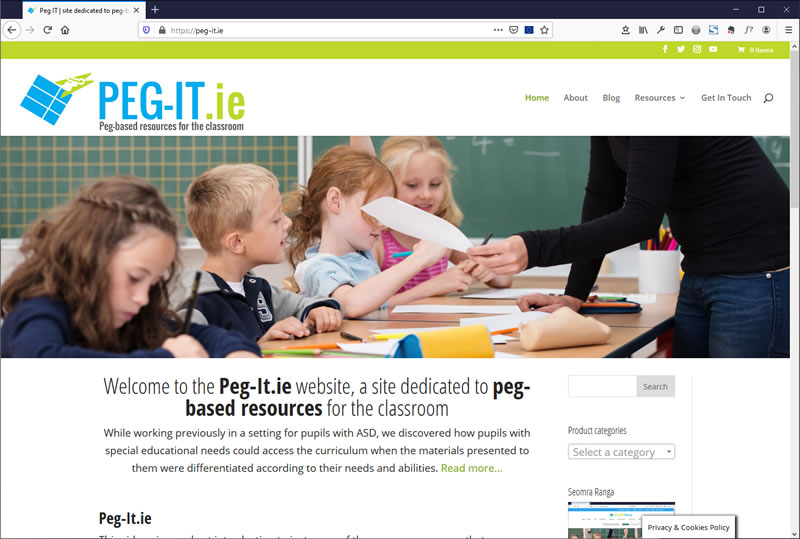
Paul Gogarty TD first joined the Green Party in 1989. He was elected to South Dublin County Council in 1999. He was first elected to Dáil Eireann in May 2002 and returned in May 2007. He represents the constituency of Dublin Mid West which includes the large population areas of Clondalkin and Lucan as well as towns and villages such as Brittas, Newcastle, Palmerstown, Rathcoole and Saggart. Paul is the Green Party’s Spokesperson on Dublin. He is Chair of the Education and Science Committee in the Oireachtas.
Seomra Ranga: Will your party leave the Croke Park agreement intact or seek to abolish it?
Paul Gogarty: We will leave it intact as if it works it will make savings. However if all unions involved in teaching and other areas do not sign up it could risk the agreement being dismantled and further pay cuts being back on the table.
Seomra Ranga: How will your party support the development of technology in primary schools, including meaningful access to quality broadband?
Paul Gogarty: The Green Party in Government had already begun a programme to introduce broadband to all second level schools. It is planned to extend this to primary schools. All the money for this came from the Department of Communications, where we had a Minister, not Education. There is huge potential to make savings in IT through the usage of cloud computing where the data and software to operate programs is all stored remotely. It cuts down on maintenance at school level and wiring and allows for cheaper interfaces than laptops to be used, meaning more children can have more access to computing for a reduced costs.
Seomra Ranga: Will your party reverse cuts in the pupil-teacher ratio?
Paul Gogarty: In the 2009 Programme for Government, we succeeded in doing this at a time when budgets were being cut and will work to further reverse and improve the ratio in primary schools.
Seomra Ranga: Will your party guarantee that there will be no further cuts to the salaries of primary school teachers?
Paul Gogarty: There can be no guarantees in the current economic situation, but we want to protect education funding in comparison with other departments.
Seomra Ranga: How does your party propose to assist young, qualified teachers in securing gainful employment in Irish primary schools?
Paul Gogarty: We would reintroduce supply panels on a regional basis with the stipulation that only available teachers be added onto the panel and that schools can only pick from this panel. This would provide opportunities for out of work teachers as well as new graduates. We acknowledge that retired teachers have much experience to offer but as they are getting pensions and graduates would have no income, it makes sense to build up experience levels in young teachers rather than use retired teachers.
Seomra Ranga: Will your party finally bring to an end the wastage of public money on prefab accommodation in primary schools?
Paul Gogarty: We will work to do this, but prefabs will never be totally eradicated as accommodation still needs to be provided while new builds are taking place.
Seomra Ranga: The Secretary of State for Education in the UK, Michael Gove, said recently of the General Teaching Council for England (GTCE), “I believe this organisation does little to raise teaching standards or professionalism. Instead it simply acts as a further layer of bureaucracy while taking money away from teachers”. What is your party’s position on the Irish Teaching Council?
Paul Gogarty: We would review all bodies, including the Teaching Council, to see whether the levels of service could be provided from within a revitalised Department of Education, which would have accessible offices in all regional centres rather than the current relocated and hard to contact Dept of Education offices in the midlands.
Seomra Ranga: What is your party’s position on church control in Irish education?
Paul Gogarty: We recognise the huge contribution made by the religious in Irish education and there would not be an education system without them. But in today’s more diverse society religion in schools needs to be re-examined. We are for choice in education but also are inclined to argue that while such choice does not exist, religious instruction should not take place in any school during school hours, including those with a Catholic ethos.
Seomra Ranga: What is your party’s position on the teaching of Irish? Should it remain compulsory?
Paul Gogarty: Yes, but we do support proposals to divide it up into basic and advanced. From our policy document: “The Green Party will put in place a comprehensive review of the teaching of Irish at primary and second level. Terms of reference will be drawn up to develop a well-planned and modern approach to language acquisition by Irish pupils, based on the most up to date language acquisition methods. Greater emphasis will also be placed on general competence in spoken Irish. The Green Party supports calls made by Conradh na Gaeilge for the reform of the teaching of Irish. These include:
– The phased introduction of ‘immersion education’ in an all-Irish college as part of the mainstream teacher training process at primary level. This would start with an initial pilot group of students and be rolled out to cover all students over a 15 year period.
– The inclusion of one extra subject to be taught to every primary school student through Irish. This would also be piloted in schools other than Gaelscoileanna that do not already teach a second subject through Irish and would be rolled out to all schools over a ten year period. While suitable subjects will be assessed by the NCCA, we recommend physical education, music and dancing as an inclusive and enjoyable way of introducing wider use of Irish into the curriculum.
– The development of two different syllabi for Irish at second level, ‘Irish Language’ and ‘Irish Language and Literature’. The student’s ability would be examined in speaking, understanding, reading and writing of the language based on the European Common Framework in the ‘Teanga na Gaeilge’ examinations and all students would sit such an exam. Litríocht na Gaeilge would be taught in Gaelcholáistí and as an extra subject for students who have a special interest or competence in Irish, just as applied maths is taught to those with a special interest or competence in maths.”
Seomra Ranga: In government, will your party allow Learning Support Teachers provide appropriate support to pupils on the top end of the Special Educational Needs category (gifted) as indicated in the EPSEN Act?
Paul Gogarty: This depends on funding availability for children with SENs who are not included as gifted. We would however ensure that the Centre for Gifted Children is adequately resourced.
Seomra Ranga: Will your party remove the embargo on the filling of middle management posts in primary schools?
Paul Gogarty: Yes, this is crucial, we would negotiate on this and related issues.
Seomra Ranga: Does your party support the current proposals to pension changes for new entrants into the profession?
Paul Gogarty: No, but we do not see it as possible to change this in the current economic climate now that it is in place.
Seomra Ranga: How does your party plan to support the 90% of deaf children in mainstream education in Ireland?
Paul Gogarty: We support the usage of ISL in schools and the campaign to have it recognized as an official language. This would ensure that adequate training and resourcing supports are provided as a matter of course.
Seomra Ranga: What is your party’s vision for primary education in Ireland in the 21st century?
Paul Gogarty: Education is vital to personal, community, societal and economic development. We will promote a flexible and transparent system aiming to value diversity, meet individual needs, cherish the environment and fulfil the highest standards of international performance.
Principles
- Schools should be at centre of local communities, and play a range of functions within those communities
- Development of energy-efficient, multi-use school buildings providing a range of services that can adapt flexibly as a community develops
- Education structures should operate in a culture of transparency and openness, embracing the DES, school management, staff, parents and students
- Education is a basic right
- Environmental education should be enhanced and integrated broadly across the curriculum
- ICT has a vital role to play in the future of education
- Education is a lifelong process
- Education structures should be both comprehensive and flexible in order to meet the diverse educational needs of the Irish population
- The overall goal of our education policy will be develop original critical thinkers
The Green Party’s 50 Steps to a Better Education System, first launched in 2006, was widely acknowledged as the most comprehensive and fully costed policy document of any political party. While the Green Party acknowledges that Education funding remains an important part of any strategy, even in these difficult economic times, we believe that there is now a growing consensus about the importance of targeted investment in Education. As well as protecting educational investment, moving to the next level requires a radical shift in how our system operates. This will require new ways of looking at how the system meets the needs of learners at all stages of life. More flexibility is required, as well as a rethinking in areas such as teacher training, curriculum and how schools integrate within the community.





